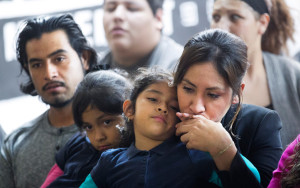More understanding needed of conflict in new migrant families
Conflict between parents and their teenage children is occurring in newly-arrived migrant families in Victoria because of social, cultural and financial challenges they and their communities face, new research has found.
The research, carried out by Deakin University, found that parents in many of these communities had a fear that young people would lose touch with their culture, particularly their language.

Newly arrived migrant families are experiencing stress and conflict due to intergenerational differences
The report, titled ‘Intergenerational Relations in Newly-Arrived Communities in Victoria: A Pilot Study Report’, found that community isolation can lead to youth disengagement and alienation and that tensions arose because of differing understandings of the rights and responsibilities of young people and the level of freedom and autonomy to which they were entitled.
“Emerging cultural differences about what constitutes appropriate types of behaviours and intergenerational relationships exacerbates tensions between adolescents and parents,” the report said.
“For example, fear of, or anger at, parental control can lead migrant youth to be unhappy at home, while the fear of loss of parental authority can lead parents to feel under increased pressure, which, in turn, raises the risk of domestic violence.”
The report found there was often a lack of understanding of appropriate parenting practices related to discipline and punishment which can result in the involvement of police and child and child protection services; and sometimes children being separated from their families.
Researcher Professor Fethi Mansouri said this could have consequences for entire families.
“For example, South Sudanese young people isolated from their families and communities were at greater risk of homelessness, alcohol and drug abuse and crime; while for Arabic-speaking youth isolation contributes to a greater risk of radicalisation,” Prof Fethi said.
He said government agencies often failed to understand the importance of community support and the risks young people faced without it.
The report said these challenges were compounded by financial difficulties which could be a result of the non-recognition of non-Australian qualifications, unaffordable bridging courses and remittances sent to families overseas.
“The pressure many of these families are under, alongside some traditional practices, can lead to family violence and family breakdown, from which a host of problems have been associated. These have significant consequences for the newly-arrived young people, their families, communities and the broader host society,” the report said.
“In attempting to address intergenerational conflicts it is important for policymakers and practitioners to understand both the nature and the interconnectedness of the challenges which place pressure on familial relationships for migrants, from acculturation to family finances,” it said.
“While the area of intergenerational relations is an urgent one for newly-arrived communities, it is important to note that intergenerational harmony is not impossible. A combination of specific programs, cultural training for service providers and a whole of community approach, can help achieve this outcome for newly-arrived families and communities in Victoria and beyond,” the report said.
It recommended some specific measure to combat the issue, including: culturally-sensitive training of child protection officers; culturally-appropriate home placements for young people who need to be removed from their families; family-centred approaches to child protection; community-led engagement to improve communication between parents and their children; and, government support for community capacity building.
The report also recommended increased support for young people’s education and skill development by parents and community members; more resources for parenting in a new culture context to minimise conflict within intergenerational relationships; and education programmes to improve financial literacy and to understand legal documentation.
“Ultimately, the research confirms that a different way of thinking is required about the acculturative process within the family context, and the need to support newly arrived young people and their families and communities,” the report said.
“There is an important, and community-acknowledged, role for government and service providers to play, alongside families and communities, to develop impactful policy and practice initiatives,” it said.
Laurie Nowell
AMES Australia Senior Journalist












